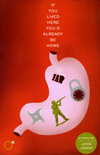If You Lived Here You’d Already Be Home
In this debut collection, characters deal with pain in bizarre ways. A suicidal woman seduces a man in a coma. A lawyer drops pennies on passersby from the window of his office building. And in the title story, the teenage male narrator declares:
In this debut collection, characters deal with pain in bizarre ways. A suicidal woman seduces a man in a coma. A lawyer drops pennies on passersby from the window of his office building. And in the title story, the teenage male narrator declares:
There are some things you should not do in the rich town up the mountain from yours and one of those is sticking your dick in their mail slots or dog doors and moving it around and thrusting your hip in and out and sometimes urinating…but this, this is precisely what my brother and I started doing one Saturday morning after our baseball season ended.
This mood is typical of If You Lived Here You’d Already be Home. Each of the 21 stories begins with a pop and then unfolds in a taut, colloquial style filled with wit and pathos. The intensity rarely wanes as the characters struggle with loss and alienation and stumble toward happiness. As a whole, the book reads like a meditation on grief.
Many of the protagonists are adolescents or adults who act like adolescents. And nearly all of them are desperate for love and acceptance. Their worlds are filled with failed or doomed romances, emotional and physical abuse, and dysfunctional families.
One highlight of the book is the way Jodzio lightens the tension with humor: from the woman with a barnacle stuck to her butt to the cancer patient who goes fishing with a steroid-addled baseball player. Even an archetypal love triangle story gets a comic twist; the rivals are a candlewick inventor and a pilot who skywrites to impress his beloved.
While no characters recur, Jodzio fixates on characters with dead mothers, absentee fathers, or both. There is also a recurrence of women who stalk girls, men who drive off bridges, and people with compulsions to swallow objects. And many characters look to animals to soothe their sadness. In one story, a boy steals an egg from a heron’s nest. In another, a veterinarian sews a hawk’s wings to a cat. And in “Monarchs,” a young man seduces women at his father’s butterfly farm with the pick-up line: “Have you ever gotten naked and had a million butterflies land on you at once? It’s like being kissed by God.”
Overall, the stories are rendered with imagination and insight into the human condition, with echoes of Raymond Carver and Amy Hempel. With all their flaws and hardships, the characters demand sympathy, but never pity. And the stories avoid sentimentality and happy endings. Instead, the payoffs come in moments when characters find reprieve from their pain, and, in the words of one, try “to use that feeling to get through the day.”





